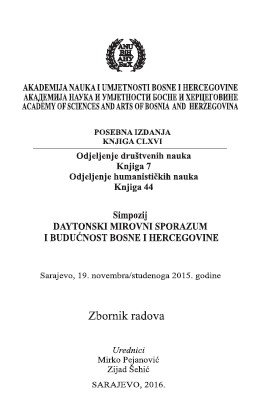FUNKCIJE MODERNOG USTAVA: PRIMER DEJTONSKOG USTAVA
LIMITATIONS OF THE DEMOCRATIC POTENTIAL OF THE POLITICAL REGIME OF BOSNIA AND HERZEGOVINA
Author(s): Vladan Petrov, Darko Simović
Subject(s): Constitutional Law, Government/Political systems, Transformation Period (1990 - 2010), Inter-Ethnic Relations, Peace and Conflict Studies
Published by: Akademija Nauka i Umjetnosti Bosne i Hercegovine
Keywords: political system; political institutions; constitution; Bosnia and Herzegovina; political parties;
Summary/Abstract: In this work, the author will deal with the nature of the political regime of Bosnia and Herzegovina. Attention will be given to institutional arrangements and their evolution in post-Dayton period, in order to answer the following questions: 1) what is the nature of the political regime; 2) what conditions it; 3) where can we see the limitations of the democratic potential of the political regime, and how to overcome these limitations. The work will be based on the following hypotheses. First, Bosnia and Herzegovina is defined as a democratic country by its constitution, but the model of democracy is based on the competitive-elitist democracy, in the form of consociation, which does not create the opportunities for effective participation of citizens in decision-making processes. Democracy, based on the struggle of national political elites, remains strictly indirect and political. Other spheres of life, such as the economy, are not democratized in the least. The author will analyze the possibility of enriching democracy in the political sphere (direct democracy). The second hypothesis will concern the institutional system of Bosnia and Herzegovina, which is structured so that the political institutions serve as a place of negotiation of the national political elites. While such nature of political institutions is largely conditioned by the nature of society and the historical and political circumstances at the time of the adoption of the Constitution, there was a partial evolution of the institutional system since 2000, although its nature is essentially not changed. The merger of national and civil in the functioning of the political institutions has not been achieved, although this would be the optimal solution.
Book: DAYTONSKI MIROVNI SPORAZUM I BUDUĆNOST BOSNE I HERCEGOVINE
- Page Range: 79-98
- Page Count: 20
- Publication Year: 2015
- Language: Serbian
- Content File-PDF

